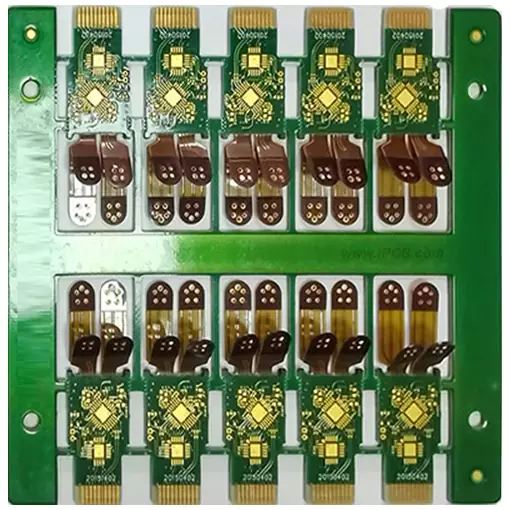
Product: Optical module Rigid-Flex PCB
Material: M6 + PI
Layers: 10L
Thickness: 0.8mm
Minimum aperture: 0.15mm
Minimum line width/spacing: 0.076mm
Copper thickness: 1oz
Solder mask: Green
Surface technology: ENIG
Product features: Resin plug hole
Appearance tolerance: ± 0.05mm
Application field: optical communication equipment
What is optical module?
The optical module consists of optoelectronic devices, functional circuits, and optical interfaces. Optoelectronic devices include two parts: emitting and receiving. The function of an optical module is to convert electrical signals into optical signals at the transmitting end, transmit them through optical fibers, and then convert the optical signals into electrical signals at the receiving end.
Classify optical modules by parameters
Pluggable optical module: hot swappable and non hot swappable
Optical module packaging form: SFP GBIC、XFP、Xenpak、X2、1X9、SFF、200/3000pin、XPAK。
Transmission rate of optical module: Transmission rate refers to the number of bits transmitted per second, measured in Mb/s or Gb/s. The optical module products cover the following main speeds: low speed, 100Mbps, 1G, 2.5G, 4.25G, 4.9G, 6G, 8G, 10G, 80G, 100G, 150G, and 200G.
The transmission rate of an optical module is a very important indicator for measuring its performance. In the 3G era, the maximum transmission rate of optical modules is generally below 5G/S. In the 4G era, the transmission rate of optical modules is generally around 5G-40G/S. However, in the 5G era, customers have significantly increased their requirements for optical module transmission rates. The transmission rate of ordinary 5G optical modules can reach>40g/s, and some customers even require the highest transmission rate to reach 200G/s. This undoubtedly poses great challenges for material suppliers and circuit board manufacturers.
So some customers take a different approach by designing the circuit board of the optical module as a Rigid Flex PCB, which allows more components to be placed inside the narrow optical module, thereby improving transmission speed. At the same time, due to the three-dimensional folding of Rigid Flex PCB in 3D space, it is beneficial for internal heat dissipation of the optical module, thereby making the transmission of the optical module more stable.
However, most optical module solutions using Rigid Flex PCB is still in the small batch stage. The biggest reason is that Rigid Flex PCB has multiple processes and high costs. If the Rigid Flex PCB solution is adopted, it will undoubtedly greatly increase the overall cost of the PCB.
Product: Optical module Rigid-Flex PCB
Material: M6 + PI
Layers: 10L
Thickness: 0.8mm
Minimum aperture: 0.15mm
Minimum line width/spacing: 0.076mm
Copper thickness: 1oz
Solder mask: Green
Surface technology: ENIG
Product features: Resin plug hole
Appearance tolerance: ± 0.05mm
Application field: optical communication equipment
iPCB Circuit provides support for PCB design, PCB technology, and PCBA assembly. You can request technical consultation or quotation for PCB and PCBA here, please contact email: sales@ipcb.com
We will respond very quickly.